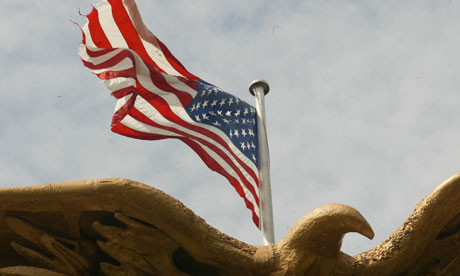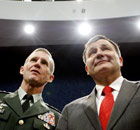Wikileaks US embassy cables: live updates
The first batch of leaked US embassy cables reveal a desire by Saudi Arabia and other Arab states to attack Iran, and US espionage against the UN. Follow all the reaction and diplomatic fallout
This page will update automatically every minute: On | Off

8.09am: Iran's state-funded broadcaster Press TV has an interesting take on the revelations that Arab states want to attack Iran to thwart its nuclear programme.
The cables revealed that Saudi Arabia's King Abdullah was recorded as having "frequently exhorted the US to attack Iran to put an end to its nuclear weapons programme", one cable stated. "He told you [Americans] to cut off the head of the snake," the cables state.
Press TV's headline asks: "Saudi king playing into US hands?"
It adds: "Analysts believe the recent document release is a scenario carefully orchestrated by US intelligence agencies to deflect attention from the United States' domestic problems, upset the situation in the region and lay the groundwork for military action against Iran." 8.00am: The Australian government has launched a "whole-of-government" investigation into Wikileaks, whose founder Julian Assange, is an Australian citizen.
Asked if Assange's passport would be removed, Australian's attorney general Robert McClelland said: "We're waiting for advice from the agencies as to appropriate course of actions that may be taken in response."7.51am: Iraq's foreign minister Hoshyar Zebari, has joined in the international condemnation of the leaks, according to AP.
He refused to discuss specifics, but called the leaks "unhelpful and untimely."7.38am: Cables to be released in the coming days are expected to further strain US relations with Hamid Karzai's government in Afghanistan. In a teaser of what's to come the New York Times, says they will detail more US suspicions of corruption in the regime.
 The US ambassador to Afghanistan, Karl Eikenberry, issued this statement in an attempt to placate Karzai and his government ahead of the leaks.
The US ambassador to Afghanistan, Karl Eikenberry, issued this statement in an attempt to placate Karzai and his government ahead of the leaks.The owners of the WikiLeaks website claim to possess some 250,000 classified documents, many of which have been released to the media. These documents were purportedly downloaded from US Defence Department computers and appear to contain US diplomatic personnel's assessments of policies, negotiations, and leaders from countries around the world, including Afghanistan, as well as reports of private conversations with people inside and outside other governments.
Whatever WikiLeaks' motives are in publishing these documents, releasing them poses real risks to real people. We deeply regret the disclosure of information that was intended to be confidential. And we condemn it. For our part, the United States Government is committed to maintaining the security of our diplomatic communications and is taking steps to make sure they are kept in confidence. We are moving aggressively to make sure this kind of breach does not happen again.
It is important to be clear that diplomatic personnel's internal reports do not represent a government's final determination of official foreign policy. In the United States, they are just one of many elements that shape our policies, which are ultimately set by the President and the Secretary of State.
When it comes to Afghanistan, our policy has been made clear by President Obama in his speech on December 1, 2009 at West Point and again at the NATO Lisbon Summit just a few days ago. The United States is absolutely committed to building and strengthening a long-term partnership with the Afghan people and the Afghan Government. Our shared goals do not change based on the release of purported diplomatic reporting from the past.
Secretary Clinton and I have spoken with President Karzai and we are all committed, along with President Obama, to looking forward and focusing on those issues that are key to the success of the Afghan people and the security of the American people.
7.23am: The UN has responded to evidence in cables that the US instructed its diplomats to spy on the UN leadership, including secretary general Ban Ki-Moon.
In a carefully-worded three-point statement sent to the Guardian, spokesman Farhan Haq, refused to address specifics, but he pointedly reminded the US that the UN is supposed to be treated as inviolable.Haq said:
1. The UN is not in a position to comment on the authenticity of the document purporting to request information-gathering activities on UN officials and activities.
2. The UN is by its very nature a transparent organisation that makes a great deal of information about its activities available to the public and member states. UN officials regularly meet representatives of member states to brief them on UN activities.
3. The UN Charter, the Headquarters Agreement and the 1946 Convention contain provisions relating to the privileges and immunities of the Organization. The UN relies on the adherence by member states to these various undertakings.
7.15am:
Hillary Clinton and several thousand diplomats around the world are going to have a heart attack when they wake up one morning and find an entire repository of classified foreign policy is available, in searchable format, to the public ... Everywhere there's a US post, there's a diplomatic scandal that will be revealed ... It's beautiful, and horrifying.
So wrote Bradley Manning, the 22-year-old former intelligence analyst, suspected of being behind the leak of more than 250,000 dispatches from US embassies around the world.
The first batch of those cables were released last night, so this is the morning for diplomatic heart attacks. And there will be more to come over the coming days.
The focus of today's cables are the revelations of Saudi Arabia's desire to attack Iran; and details of US diplomats being ordered to spy on the United Nations leadership.
Later today the Guardian will publish more details about what the cables say on North Korea. The Guardian's editor, Alan Rusbridger, will be online at 4pm to take questions on the paper's decision to cover this story. Meanwhile, David Legih tells the story of how the 250,000 cables were leaked, and an editor's note explains the Guardian's decisions on which cables to publish, which to redact and which to keep secret.
Four other international media organisation who have also been working with Wikileaks on the disclosures, the New York Times, Le Monde, El País and Der Spiegel, have been explaining their own approaches to the cables.
There has been a hostile response to the leaks from politicians around the world. You can follow the initial reaction in last night's live blog.
US Republican senator Peter King, a member of the Homeland Security committee said Wikileaks should be treated as a terrorist organisation. Republican Senator Lindsey Graham, warned that "Wikileaks could have blood on their hands".
Italy's foreign minster Franco Frattini described the leaks as the 9/11 of world diplomacy.
US diplomats have been frantically trying to contain the damage. Washington's new ambassador to Pakistan, Cameron Munter, published an article today in a Pakistan's English-language paper, the the News, which aims to pre-empt unflattering references to the Pakistani government and its military.
Declan Walsh, our correspondent in Pakistan, writes:
Munter offers a coded half-apology for the content of the Pakistan files. "Of course, even a solid relationship will have its ups and downs," he says, adding later that "Honest dialogue -within governments and between them- is part of the basic bargain of international relations; we couldn't maintain peace, security, and international stability without it. I'm sure that Pakistan's ambassadors to the United States would say the same thing."
The cables likely to trouble Munter, which include allegations that the military is colluding with militant groups and unflattering pen portraits of leading politicians, were written by his predecessor Anne Patterson, a sharp, well-regarded diplomat who left Islamabad a few months ago. The Pakistan files are due to be published in the coming days.
